
The 1936 Summer Olympics, officially known as the Games of the XI Olympiad and commonly known as Berlin 1936, was an international multi-sport event held from 1 to 16 August 1936 in Berlin, Germany. Berlin won the bid to host the Games over Barcelona at the 29th IOC Session on 26 April 1931. The 1936 Games marked the second and most recent time the International Olympic Committee gathered to vote in a city that was bidding to host those Games. Later rule modifications forbade cities hosting the bid vote from being awarded the games.
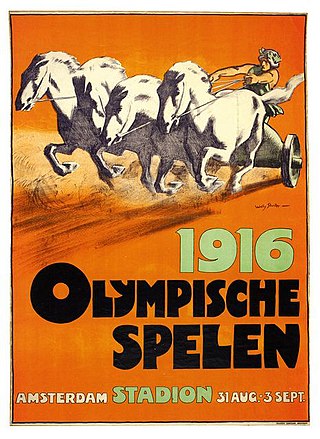
The 1916 Summer Olympics, officially known as the Games of the VI Olympiad, were scheduled to be held in Berlin, German Empire, but were eventually cancelled for the first time in their 20-year history due to the outbreak of World War I. Berlin was selected as the host city during the 14th IOC Session in Stockholm on 4 July 1912, defeating bids from Alexandria, Amsterdam, Brussels, Budapest and Cleveland. After the 1916 Games were cancelled, Berlin would eventually host the 1936 Summer Olympics, twenty years later.

The 1964 Winter Olympics, officially known as the IX Olympic Winter Games and commonly known as Innsbruck 1964, was a winter multi-sport event which was celebrated in Innsbruck, Austria, from January 29 to February 9, 1964. The city was already an Olympic candidate, unsuccessfully bidding to host the 1960 Games. Innsbruck won the 1964 Games bid, defeating the cities of Calgary in Canada and Lahti in Finland. The sports venues, many of which were built for the Games, were located within a radius of 20 km (12 mi) around Innsbruck. The Games included 1,091 athletes from 36 nations, which was a record for the Winter Games at the time. Athletes participated in six sports and ten disciplines which bring together a total of thirty-four official events, seven more than the 1960 Winter Olympic Games. The luge made its debut on the Olympic program. Three Asian nations made their Winter Games debut: North Korea, India and Mongolia.

Wolfgang Paul was a German physicist, who co-developed the non-magnetic quadrupole mass filter which laid the foundation for what is now called an ion trap. He shared one-half of the Nobel Prize in Physics in 1989 for this work with Hans Georg Dehmelt; the other half of the Prize in that year was awarded to Norman Foster Ramsey, Jr.

Tor Vergata University of Rome, also known as the University of Tor Vergata, is a public research university located in Rome, Italy. Located in the southeastern suburb of Rome, the university combines a liberal arts tradition with emphasis on career orientation in the field of Economics, Engineering, Mathematics and Physics, Natural Sciences, and Medicine.
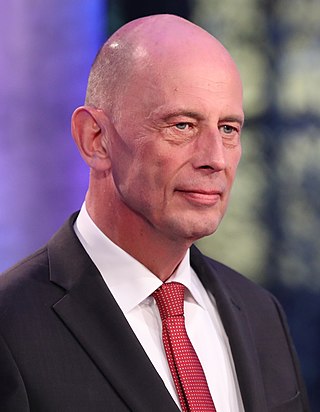
Wolfgang Tiefensee is a German politician of the Social Democratic Party (SPD). He was the Federal Minister for Transport, Building and Urban Development in the grand coalition cabinet led by Angela Merkel between 2005 and 2009. Since 2014, he has been the State Minister of Economy, Science and the Digital Society in the government of Thuringia's Minister-President Bodo Ramelow.

Brian Robert Barwick is an English rugby league administrator. He has enjoyed a long and distinguished career in major sports broadcasting and administration. He was awarded an OBE in the 2021 Queen's Birthday Honours List for services to sport and broadcasting.
Andrew S. Zimbalist is an American economist and author of twenty-four books. He is the Robert A. Woods Professor of Economics at Smith College.
Thorsten Engelmann is a German rower. Engelmann started rowing at age 9 because his father was the president of a rowing club in Berlin. He continued training while earning his pre-diploma in economics at school, and was a member of the German national squad.
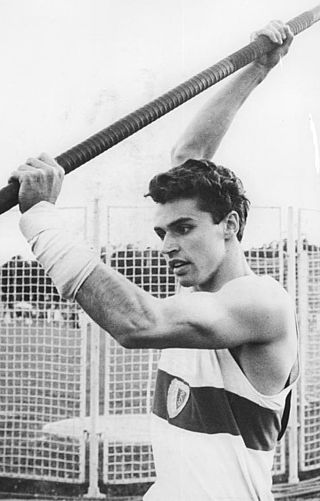
Wolfgang Nordwig is a former East German pole vaulter. He competed in the 1968 and 1972 Olympics and won a bronze and a gold medal, respectively, clearing 5.50 m in 1972.

Kenkichi Oshima was a Japanese triple jumper who won a bronze medal at the 1932 Summer Olympics in Los Angeles. He was the flag bearer for Japan at the 1936 Games in Berlin.
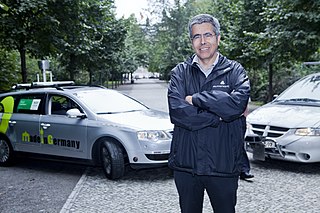
Raúl Rojas González is an emeritus professor of Computer Science and Mathematics at the Free University of Berlin, and a renowned specialist in artificial neural networks. The FU-Fighters, football-playing robots he helped build, were world champions in 2004 and 2005. He is now leading an autonomous car project called Spirit of Berlin.
Wolfgang Friedrich Stolper was an American economist.
Wolfgang Wiegard is a German economist and member of the German Council of Economic Experts. He served as chairman of the council from April 2002 to March 2005.
Hans Lenk is a German rower who competed for the United Team of Germany in the 1960 Summer Olympics, and an Emeritus Professor of Philosophy. He was born in Berlin.
Wolfgang Mayrhofer is an Austrian competitive sailor and Olympic silver medalist as well as Full Professor of management at WU Vienna in Vienna, Austria.
Wolfgang Konrad Spohn is a German philosopher. He is professor of philosophy and philosophy of science at the University of Konstanz.
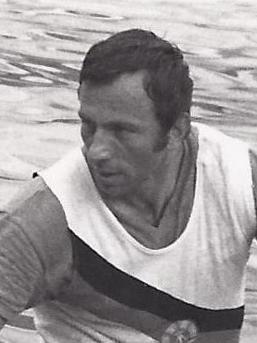
Götz Draeger, sometimes incorrectly referred to as Dräger, is a German rower.

Wolfgang Roth was a German politician and member of the Social Democratic Party of Germany (SPD). He was a member of the German Bundestag from 1976 until 1993. Roth was the vice president of the European Investment Bank from 1993 to 2006.
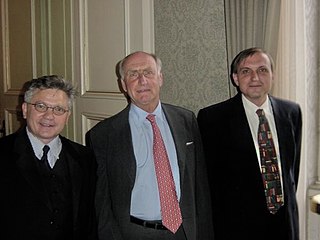
Wolfgang Karl Härdle is a German statistician and University Professor at the Faculty of Economics of the Humboldt University of Berlin.












